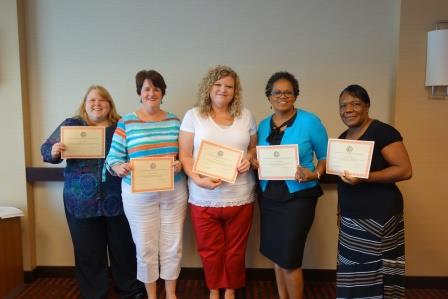In September, five officials graduated from the Municipal Clerks and Treasurers Institute, a three-year program that provides municipal clerks and treasurers with the skills critical to their profession.

The fall graduates are Patti Chasteen, clerk/treasurer for the Town of Due West;
Heather Holcombe, municipal clerk for the Town of Pelzer; Gwen Kinard, clerk/treasurer for the
City of Laurens; Hannah Parler, municipal clerk for the City of Bishopville; and Shelly Spivey, municipal clerk for the City of Landrum.
During MCTI, clerks learn about the importance of keeping accurate minutes to preserve the history of council actions. Spivey noted that when she started the job in Landrum, she had no institutional memory about the city, and found reading years of accurate minutes helped her get up to speed.
"Reading years of minutes is a great way to better understand the history of the town as well as the background in some of the decisions that were made well before my time as city clerk," said Spivey.
"It was also fun to see how over the last 75 years how little has changed in regard to the residents’ requests and complaints."
To receive their certificates, the graduates attended more than 120 class hours on topics such as financial management, overview of government, public administration and conducting meetings.
During the September session, Holcombe received a scholarship to attend the Institute. The scholarship is underwritten by the Municipal Association and is available only to South Carolina Municipal Finance Officers, Clerks and Treasurers Association members. They may receive scholarships for up to six sessions.
MCTI graduates who are interested in pursuing the Certified Municipal Clerk designation from the International Institute of Municipal Clerks may apply their 120 hours of classroom time in MCTI toward the education requirements of the Certified Municipal Clerk program by completing a capstone project.
The capstone project is a method of applying knowledge that a graduate gained through the MCTI program. It allows the clerk or treasurer to select a project that addresses a need and then complete that project.
The MCTI participant must select a project, get approval from a certification committee that oversees the capstone process, complete the project and then present it to the committee.
Recent MCTI graduates who successfully completed capstone projects include: Teresa Benjamin, clerk/treasurer with the City of Lake City; Deborah Hargis, municipal clerk with the Town of Edisto Beach; Angie Overton, clerk treasurer with the Town of Williston; Paula Payton, municipal clerk with the Town of West Pelzer; Shelly Spivey, city clerk with the City of Landrum; and Ethel Wynn former clerk/treasurer with the Town of Patrick.
Overton’s capstone project was about succession planning in the areas of payroll and accounts payable, and involved making step-by-step instructions, complete with screenshots. The project brought Overton an unexpected gain—a broader networking group.
"I had to reach out to many people to see what their procedures on certain things are, and this expanded my network tremendously," she said. Overton said the most challenging part of the project was finding the time in her normally busy schedule.
"I wouldn’t call the process difficult. It was more tedious and time-consuming but worth it in the end," she said.
Hargis also pointed to the time crunch.
"We all wear so many hats, from human resources director to risk management to social media coordinator," she said. "It is a real struggle to find time during the day for one more project."
Devoting a small portion of her day exclusively to her capstone project proved to be the key. "Daily focus also kept the project in the forefront and didn’t let it get buried under day-to-day functions of the job."
Hargis’ project explained the benefits of electronically archiving documents.
"In the short term, records are easily searched and available to employees, and some are available to the public," she said. "In the long term, the amount of paper used will be significantly reduced and hopefully will encourage town council and employees to go paperless as much as possible."
